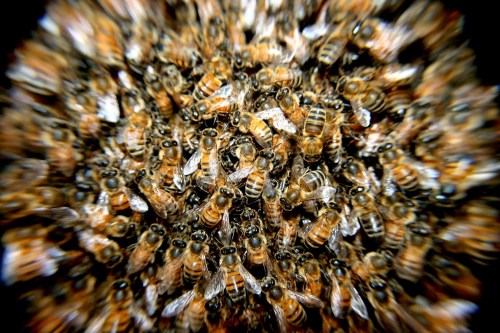Bees, really? What are we bumbling about this time? With all the Internet of Things excitement in healthcare, security and the home, the world of bees seems not very buzz-worthy, does it? Well, think again.
Bees are dying off and that doesn’t just mean less honey in our tea. According to the U.S. National Agricultural Statistics, just the honey bee’s hivedom in the U.S. alone has seen a 60 percent reduction in last 60 years. For each bee that disappears, 300 million plants aren’t pollenated—bees are essential to the production of about a third of all food we eat. Our ecosystem flies on the wings of bees.
There’s a lot of controversy about why the bee population has seen such a dramatic decline, but we aren’t going to get into that. Instead, we’re going to talk about how technology is providing a unique opportunity to help our bee buddies buzz while city dwellers make some extra cash.
The buzzing business of bees
As absurd as it seems to be rearing animals in a city center, urban farming truly offers a unique opportunity to provide high quality food on your brownstone doorstep. I myself have fallen in love with the London city farms, their adorable livestock, and the delicious, organic and local brunches they offer. With millennials’ newest trend in mind, one startup decided to save the world, one bee at a time!
It all started when a team was asked by a French farming school to provide a system to avoid high-bee-robbery. They soon found it too expensive to create a special solution just for hive security, which is when they discovered an urban beekeeping trend spreading everywhere from Hong Kong to San Francisco to Johannesburg.
Hostabee is a a smart beehive system that blends modern IoT technology, an ancestral rural practice, and an AirBnB business model.
Citizens can do their part for the Earth by hosting the bees, and they can either keep some of the honey or profits from its sale. Beekeepers can modernize and expand their business, sharing profit with the startup. The Hostabee platform is there to help the beekeeper manage the much more distributed logistical organization. And all the data collected is published as open data for scientific analysis.
Hostabee and other connected beekeeping companies are leveraging the sharing economy. The startup looks to turn beekeeping into a service provider profession, “to integrate this activity into a circular economy process because it’s complimentary with vegetation” and for city dwellers to produce their own food for their own consumption.
They began focusing their business model on the B2B market, placing e-hives on top of office buildings. So many companies like our own Telefonica have been working hard to have a greener culture by doing things like strongly restricting paper usage. Beekeeping is another way that companies can “green-wash” their public images. Now Hostabee want to open it up to rooftops and gardens.
This will helps spread the program and because they “want to teach kids that food does not come from factories,” Vincent Demortier, head of Hostabee’s business development, told ThinkBig.
For them, it’s also about education and research which is why Hostabee decided to build their business model on top of a backend that allowed for easy sharing of open data.
[youtube]https://www.youtube.com/watch?v=2hcw_7WHvWQ&feature=youtu.be [/youtube]
Open data continues to drive the Internet of Things
Everything about Hostabee is standardized, with a hive frame that can work with any kind of beehives, since there are about 4,000 kinds of bee populations, almost all of which are in danger right now. A true Internet of Things startup, it brings together this hardware, the service provider beekeepers, and the right locations with sensors, all with a backbone of software and a focus on open data to be shared among cities around the world.
The team decided to build the Internet of Things architecture on top of the Telefonica-backed Fiware backend. They then went and won a Fiware hackathon and subsequently won a spot in the Fiware startup accelerator. Then, Hostabee gained even more Fiware funding “to animate and sustain a developer community in collaboration with the local university, to publish open data for scientists [and] to correlate kinds of flowers.”
Each smart hive comes equipped with ten sensors that feed into the Hostabee platform and the Fiware open data resource to track temperature, humidity and the sun level. Through these factors, they can simply evaluate the lifecycle status of the beehive—Is honey ready for cultivating? Does the beekeeper have to schedule a business call to prevent a swarm?

Can’t this business model really sting ya?
While this may be good for business and the environment, there’s also a fear factor, but “We can reduce the risk of having these ‘dangerous animals’ in the city,” Demortier said, air quotes flying.
Unless you swat at them, bees are gentle beasts, except every once in awhile when bee colonies get in a bit feisty and the risk of a swarm becomes real.
Demortier explained: “First they will feed the set of ten to 12 queens like a military corps, and then there will be a competition” for the new queen. When that new queen is strong enough, it’s time for that old queen to go. This is the old queen gathers her troops around her and they get ready to fly on. When she’s readying her troops, a seemingly threatening to humans sound emits and, in all this excitement, it gets a little heated in there—quite literally.
Each Hostabee smart hive comes equipped with ten sensors for constant monitoring, that feeds into a cloud-based backend, which offers both the host and beekeeper updates and recommendations based on activity algorithms.
“Instead of letting the old swarm leave, we can send an alert to the beekeeper, pick up the old queen and her bees and move to a new hive. Or you can kill the old queen, but then you can overpopulate.” The idea is that, instead of releasing a swarm of bees on a city like a bad science fiction flick, Hostabee notifies the beekeeper just in time, so she has the opportunity not only to keep her business—and human neighbors—secure, but to expand her business, cultivating and segregating to start new hives.
Why city bee beats country bee
“Bees that cultivate honey in the city are earthier and more productive than those in the country,” Demortier said. City vegetation comes with distinctly fewer pesticides and chemicals. There’s also greater flower diversity in a city compared with rows of the same plant being farmed in the country.
But that doesn’t mean all cities are flying to get involved. Of course, you need permits in some places and food sanitary certificates in others. London has more than 4,000 urban beehives, while Paris has only 500. They are so far prohibited in Madrid.
These beehives also offer cities other opportunities to collect other data so smart cities can monitor things like weather and pollution. Plus, the health of these city buzzers also reflects the overall environmental health of the city. Already Hostabee is sharing open data with cities about vegetation in the area, which the startup uses itself to evaluate the quality of the honey and the health of the bees producing it in different regions.
But will this trend really leave its mark on the world? Would you be a hive host? Tweet to us your thoughts @TefDigital and @JKRiggins!









